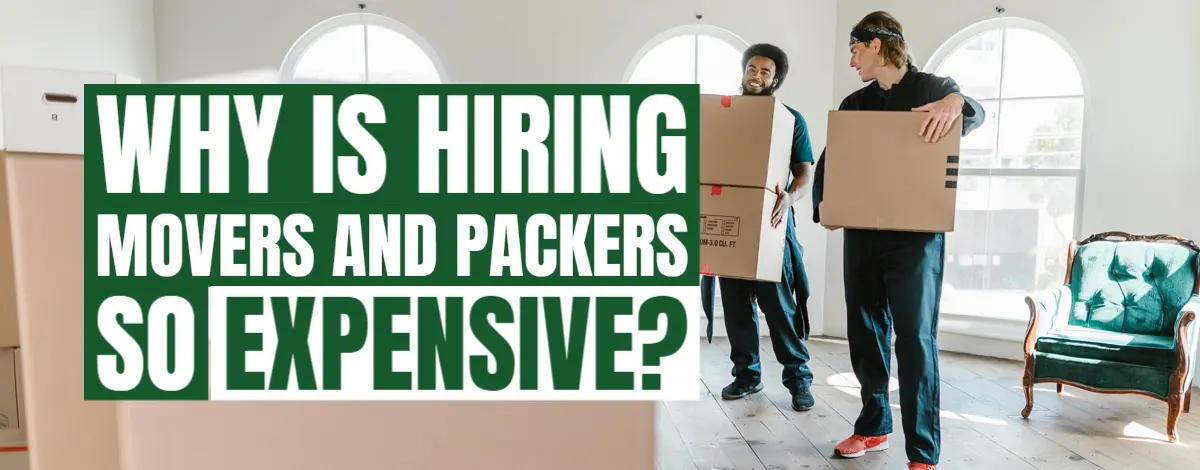If you’ve ever planned a house move, you’ve likely felt that hiring movers and packers seems surprisingly expensive. At first glance, it might appear that you’re only paying for transport and a few hours of labor. But behind those figures lies a complex mix of logistics, expertise, equipment, manpower, and liability, all designed to make your move seamless and safe.
This guide breaks down exactly why movers charge what they do, how professional moving services are priced in India and abroad, and whether the investment is actually worth it. You’ll also find useful cost examples, tips to reduce your moving bill, and guidance on making a smart, stress-free relocation choice.
Why Are Movers So Expensive?
Hiring professional movers isn’t just about paying for a truck and labor. It covers a full service package involving logistics, safety, planning, and liability.
1. Specialized Equipment
Movers use professional-grade tools — furniture dollies, ramps, lifting straps, padding, and hydraulic lifts — to move bulky or fragile items safely. Such specialized gear helps prevent damage but also increases operating costs. According to This Old House, the packing materials for a typical 3-bedroom home can cost up to $750 alone.
2. Specialized Training
Professional movers undergo training to lift heavy items safely, navigate tight spaces, and handle fragile objects correctly. This training ensures fewer accidents and damages — part of what you pay for. North American Van Lines notes that specialized handling and service requests directly influence the total cost.
3. Specialized Moving Services
Services like packing, unpacking, furniture disassembly, and storage add to the base rate. Each additional task requires manpower and materials, which explains why “full-service” moves cost more than transport-only packages.
4. Overall Coordination and Planning
Behind every successful move is detailed coordination — scheduling vehicles, securing permits, mapping routes, and timing multiple pickups. Edson’s Movers explains that such logistical planning becomes particularly complex (and costly) for intercity or cross-country relocations.
5. Liability Coverage
Professional movers assume responsibility for your belongings while in transit. That means insurance or valuation coverage is factored into the price. Allied Van Lines notes that liability protection options — such as full-value coverage — can significantly increase overall cost.
6. Labour and Time Intensity
More belongings = more packing time, loading effort, and manpower. North American Van Lines confirms that labor intensity and total weight or volume are major cost determinants.
7. Rising Fuel and Transportation Costs
Fuel and maintenance costs have a direct impact on moving rates, especially for long-distance trips where trucks cover hundreds of kilometers daily.
8. Seasonal Demand and Market Rates
Prices often surge during peak moving seasons (April to August) or weekends. North American Van Lines adds that moving during off-peak times can yield noticeable savings.
Are Movers Worth It?
Even with the high price tag, most homeowners agree that hiring professional movers brings undeniable benefits.
1. Safety
Moving heavy items without training can lead to injury or property damage. Professionals are equipped to handle these safely, minimizing risks.
2. Efficiency
Trained crews can complete a move in hours that might take you days. Their speed, tools, and teamwork drastically cut downtime.
3. Time and Convenience
From disassembling furniture to loading trucks, movers handle tedious details, saving you valuable time and stress.
4. Peace of Mind
As Allied Van Lines explains, knowing your move is insured and managed by professionals provides real peace of mind — especially for long-distance relocations.
5. Reduced Risk of Damage or Injury
Professional packing techniques and secure transport reduce the likelihood of damage to expensive furniture, glassware, and electronics.
6. Access to Insurance and Professional Accountability
Licensed moving companies offer valuation coverage and regulated practices, giving you legal and financial recourse in case of loss or delay (Move.org).
How Are Professional Moves Priced?
1. Distance and Travel Time
The farther you move, the more fuel, time, and tolls are required. Long-distance moves also involve overnight costs for drivers and vehicle wear.
2. Volume or Weight of Belongings
Charges are typically based on weight (U.S.) or volume (India) — more items mean higher truck space and manpower needs.
3. Type of Move
- Local: Priced hourly (usually 3–4-hour minimums)
- Domestic/Intercity: Charged per kilometer
- International: Based on weight and customs fees
4. Additional Services
Packing, furniture assembly, storage, and unpacking are optional add-ons — each adding to the base quote (North American Van Lines).
5. Insurance and Liability Coverage
Higher-value coverage options, like full replacement protection, add to total cost.
6. Seasonal Pricing
Rates increase during weekends, month-ends, and summer moving peaks due to higher demand.
How Much Do Movers Cost?
1. Average Cost Range
- India: ₹4,000–₹20,000 for local household moves depending on BHK size
2. Cost Breakdown
Packing services range from ₹8180–₹15000,
3. Cost Influencers
Distance, timing, load volume, extra services, and valuation coverage.
4. Saving Tips
- Move during weekdays/off-season
- Declutter before packing
- Compare multiple quotes before booking
How Much Do Movers Charge for a Local Move?
1. Hourly Rates and Minimums
Local movers in India often charge by the hour or a fixed rate, with a 4-hour minimum. Example: ₹1,000–₹1,200/hour for 3 workers and a truck.
2. Cost by BHK
- 1BHK: ₹4,000–₹11,000
- 2BHK: ₹6,500–₹16,000
- 3BHK: ₹10,000–₹20,000
3. Hidden Charges
Toll taxes, long-carry fees, disassembly, and GST may apply
4. Comparing Quotes
Check inclusions carefully: some quotes exclude packing or insurance.
Long Distance Movers Cost
1. Distance-Based Models
Charged per kilometer or per mile. In India, expect ₹20–₹40/km for intercity moves.
2. Cross-State or Cross-Country Factors
Fuel, lodging, and tolls contribute to higher rates.
3. Why They Cost More
More logistics, more manpower, and greater risk of delays or damage.
Do You Have Items That Would Be Expensive to Replace?
1. Fragile and Valuable Items
Mirrors, antiques, and artwork need specialized packing — materials alone can reach hundreds of dollars.
2. Electronics and Appliances
Professional handling prevents damage to costly TVs, refrigerators, or computers.
3. Furniture and Custom Pieces
Large or modular furniture often requires disassembly and padding, adding to labor time.
4. Why Pros Save You Money Long-Term
Damage prevention and insurance make professional movers more economical than replacing broken valuables.
Is the Cost Worth the Time Saved?
1. DIY vs Professional
Doing it yourself saves upfront costs but risks fatigue, injury, and breakage.
2. Opportunity Cost
Your time, stress, and physical effort often outweigh the savings.
3. Movers Save Days of Effort
A professional team can complete a 2BHK relocation in half a day versus 2–3 days DIY.
Will Outsourcing Protect Your Peace of Mind?
1. Stress-Free Experience
Movers manage everything — packing, transport, unloading — freeing you from physical and logistical stress.
2. Reduced Risk of Damage or Delay
Professionals follow proven processes and offer damage accountability.
3. Timely Delivery
Their scheduling systems ensure on-time delivery.
4. Accountability
Licensed packers and movers offer insurance and transparent contracts.
Are You Sacrificing Long-Term Financial Goals?
1. Evaluating Cost vs Value
Think of it as an investment — your belongings arrive safely, and your time and energy are saved.
2. Budgeting and Planning Ahead
Use online cost calculators to plan realistically.
3. Avoiding Last-Minute Expenses
Booking early and choosing mid-month, mid-week slots can cut costs.
4. Smart Financial Choice
A well-reviewed, licensed mover prevents costly mistakes — a wise long-term decision.
Hiring movers and packers can feel expensive, but when you consider the training, safety, equipment, insurance, and efficiency that come with the service, the cost often justifies itself. Whether you’re moving locally within your city or relocating interstate, professionals make the process safer, faster, and less stressful — saving both time and money in the long run.
Planning your next move? 6 Packers and Movers offers verified, affordable, and insured relocation services across India. From small apartments to full-house moves, their expert teams handle every step — packing, loading, transport, and delivery — with care and professionalism.
Get your free moving quote today from 6 Packers and Movers and enjoy a smooth, stress-free relocation experience.
Frequently Asked Questions about Hiring Movers and Packers:
Why is hiring movers and packers considered expensive?
Hiring movers and packers can be costly due to various factors, including the specialized equipment and training required for handling belongings safely, as well as the expertise and experience of the moving professionals.
What specialized equipment do movers and packers use?
Movers and packers utilize specialized equipment such as moving trucks, sliders for furniture, dollies, hoisting straps, ropes, blankets, bubble wrap, and foam sheeting to ensure the safe and efficient transportation of belongings.
What advantages do skilled and experienced movers and packers offer?
Skilled and experienced movers and packers can efficiently pack items, navigate challenging moving situations, and provide specialized services to address unique moving needs, ultimately ensuring a smoother and more effective relocation process.
How do moving companies ensure safety during the moving process?
Moving companies prioritize safety by employing seasoned and trained movers, using proper lifting techniques, employing preventive measures to protect property and belongings, and utilizing equipment like furniture sliders to minimize the risk of damage.
What liability coverage options do moving companies offer?
Moving companies typically offer liability coverage options such as Released Value Protection and Full Value Protection, providing varying levels of coverage for lost, damaged, or misplaced items during transit.



